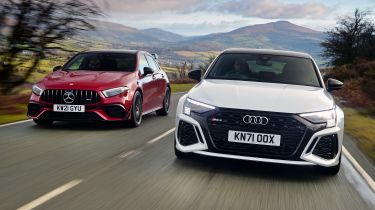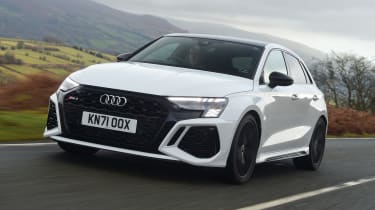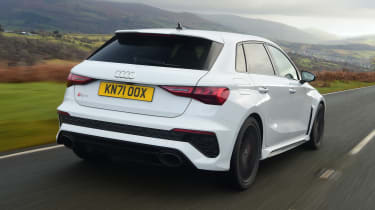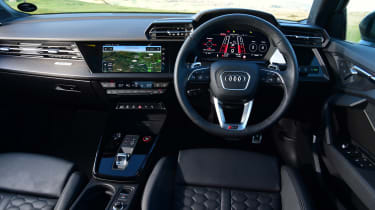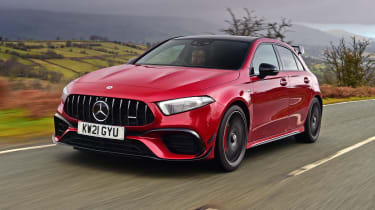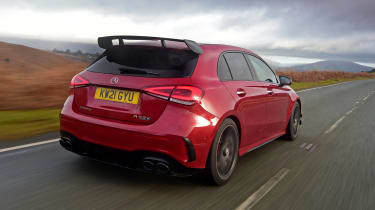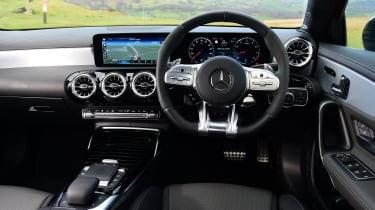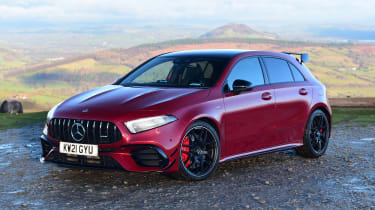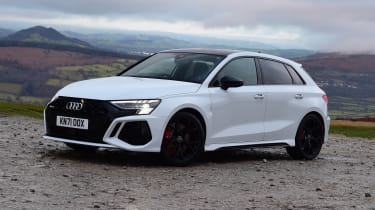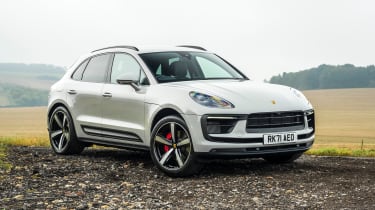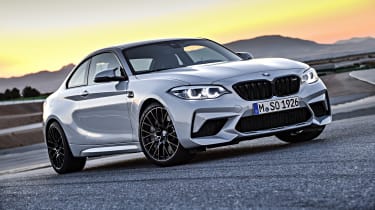Audi RS 3 vs Mercedes-AMG A 45 S: 2022 twin test review
Two of the hottest hatches on sale do battle as we pitch the new Audi RS 3 against the Mercedes-AMG A 45 S
A little over 20 years ago, 395bhp was a serious amount of power for any road car. You’d be pretty chuffed with that figure from a mid-engined piece of Italian exotica; indeed, if you bought a Ferrari 360 Modena back in 1999, that’s exactly what you’d get.
These days, it’s possible to buy an Audi A3 with exactly the same output. Granted, the latest RS 3 Sportback is no ordinary A3 – it’s the fastest-accelerating hot hatchback on the market today, and on the right road its four-wheel-drive traction will give even modern supercar drivers something to think about.
But it still isn’t the most powerful hot hatch on sale. Step forward its main rival: the 415bhp Mercedes-AMG A 45 S. Thanks to four-wheel drive and launch control systems, both would blow the 360 away from a standstill, but these modern-day supercar-slayers need to do far more than that. There must also be comfort, practicality and – above all – excitement in abundance alongside raw speed when you’re sinking the best part of £60,000 into a five-door hatch.
So which of these two strikes the ultimate balance? We took them to some stunning Welsh roads to find out.
Audi RS 3
| Model: | Audi RS 3 Sportback quattro Carbon Black |
| Price: | £59,055 |
| Engine: | 2.5-litre 5cyl turbo, 395bhp |
| 0-62mph: | 3.8 secs Economy: |
| Economy: | 31.4mpg/6.9mpl |
| CO2: | 207g/km |
| Annual road tax: | £490 |
The Audi RS 3 Sportback in our pictures is in Launch Edition trim, which was limited to just 96 units in the UK. We’re instead testing the newcomer in Carbon Black spec, which costs £59,055 before extras.
Used - available now
Design & engineering
Taking the humble A3 as a starting point meant that Audi’s RS division needed to make extensive changes to almost every aspect of the driving experience.
The work starts with the suspension – most of which is unique to the RS 3. The front gets redesigned pivot bearings for the struts, while the subframes and stabilisers are stronger. The lower wishbones are stiffer, and their forward edge has also been aerodynamically profiled to direct air rushing under the car towards the 375mm front brake discs. There’s one degree of extra negative camber at the front and half a degree more at the rear when compared with the standard A3, where there’s also a thicker anti-roll bar and a tougher subframe. The ride height drops by 25mm relative to the standard car, too.
Part of that strengthening is necessary to cope with the engine. At a time when big-capacity motors in small cars have become increasingly rare, the RS 3 is the one glorious flag-bearer for the practice, with a 2.5-litre five-cylinder turbocharged unit making 394bhp and a thumping 500Nm of torque. That’s an identical torque figure to the Mercedes, but the Audi hits that peak at 2,250rpm and maintains it all the way to 5,600rpm – at which point the Mercedes has only reached its peak just 600rpm before.
New to the RS 3 this time around is the Torque Splitter. This uses electronically controlled clutches on each rear driveshaft, and sends more power to the outside wheel during hard cornering, in effect pushing the car around the turn.
The Launch Edition car driven here features adaptive dampers as standard – on the Carbon Black, this is part of the £5,000 RS Dynamic pack. This also includes a sports exhaust, an increase in top-speed limit to 180mph, and carbon front disc brakes, which measure 380mm and trim 10kg from the unsprung weight on the front axle.
However, two key features on this test car aren’t coming to the UK: the Alcantara-trimmed steering wheel, and more crucially, there’s no option to specify some track-focused Pirelli P Zero-R tyres.
Driving
For many, the key selling point of the Audi is its engine, and with good reason – it’s wonderful. The 2.5-litre five-cylinder feels every bit as quick as the launch control-enabled 3.8-second 0-62mph time suggests, but even on the road it feels searingly rapid because it has such a muscular feel to its lower and mid ranges.
The power is almost too constant at times, though; with the engine giving so much shove right up to its maximum, it’s easy to accidentally butt into the rev limiter if you’ve taken manual control of the gearbox. The seven-speed dual-clutch auto shifts quickly and smoothly, although doesn’t quite have the AMG’s responsiveness. Our RS 3 featured steel disc brakes, which have huge stopping power, but a pedal that isn’t as firm as the Mercedes’. We’ve also sampled the carbon items on track; even after repeated heavy stops, they showed absolutely no hint of fade.
On the road during everyday use, the RS 3 is marginally the more refined and easy to live with of this pair. A big part of that is down to its impressive ride comfort; despite sitting as the flagship of the A3 range, the sophistication of the optional adaptive dampers means the ride is at least as forgiving as even the most softly sprung alternatives lower down the line-up. It’s not as busy as the A 45’s set-up, either.
Practicality
The need to package the Audi’s quattro four-wheel drive system underneath has forced the level of the RS 3’s boot floor higher than you’ll find in the standard A3. The resulting volume of 282 litres is 88 litres smaller than the A 45’s boot.
Everything else is standard A3 fare, so boot aside, the RS 3 remains a practical five-door hatchback. The Audi offers a little more rear legroom than the Mercedes, and the flatter rear bench makes it a touch more comfortable for three people. The smartphone cubby is reasonably snug and sunken into the dash, which means your device is held neatly in place during more enthusiastic driving.
Ownership
In the 2021 Auto Express Driver Power satisfaction survey, Audi’s overall scores were a little disappointing. The brand took 23rd place out of 29 in the manufacturer rundown, and the dealer network didn’t shine particularly brightly, either, placing 18th out of 21. Mercedes scored slightly above average in both categories, taking 13th and 9th respectively.
Running costs
As desirable performance cars, both the RS 3 and the A 45 S hold their values very strongly – but it’s the Audi that has an edge. It’s expected to retain 56.6 per cent of its value after three years, compared with 53.3 per cent for the AMG. On the other hand, costs such as insurance will prove to be quite high for both cars.
Based on our representative quote for a 42-year old male driver with three points on his licence, both cars straddle the £1,000 figure per year, with the Mercedes emerging as the less expensive of the two hot hatches here.
If you’d rather have a saloon, then the RS 3 is available as a four-door for £1,000 extra. While there’s no A 45 S saloon, the CLA 45 S four-door coupé is available; it costs from £60,075.
Testers’ notes
“The small LED squares at the base of the headlights form a chequered flag pattern on the move, and spell out ‘R-S-3’ when the car is unlocked.”
Mercedes-AMG A 45 S
| Model: | Mercedes-AMG A 45 S 4MATIC+ Plus |
| Price: | £57,885 |
| Engine: | 2.0-litre 4cyl turbo, 415bhp |
| 0-62mph: | 3.9 secs |
| Economy: | 31.1mpg/6.8mpl |
| CO2: | 206g/km |
| Annual road tax: | £490 |
At £57,885, the Mercedes-AMG A 45 S slightly undercuts the mid-ranking RS 3 Carbon Black, but add this car’s £795 optional paint and the Driving Assistance pack, which for £1,495 includes blind-spot warning and active cruise control with automated lane keeping, and the total comes to £60,175.
Design & engineering
As with the RS 3, turning the standard A-Class into the hardcore A 45 S was an extensive process. The suspension is key among those changes. The MacPherson strut front arrangement has been upgraded with unique aluminium wishbones to reduce unsprung mass, and the axles at each end are held by solidly mounted carriers. Adaptive dampers are fitted as standard, and the track is widened front and rear to improve lateral grip. The speed-sensitive power steering system is also rigidly mounted, which is claimed to improve its precision.
To help that uprated suspension to work at its best, AMG’s engineers also beefed up the standard A-Class’s structure with a front strut brace. There are reinforcing plates between the side members and the A-pillars, too, an aluminium strengthening panel below the engine, and diagonal struts under the floor.
Then there’s the car’s engine. The 2.0-litre turbocharged M139 unit has a smaller capacity than the Audi’s, but its 415bhp peak is 20bhp higher, and this is made at 6,750rpm – 1,250rpm above the RS 3’s peak. It doesn’t have the low-down torque of the Audi’s motor, but that’s deliberate; AMG’s engineers wanted to give it the character of a naturally aspirated engine. The result is 500Nm from 5,000-5,250rpm, and a 7,200rpm red line. Power is sent to all four wheels, with the rear axle featuring a dual multi-disc clutch arrangement like on the RS 3. It can variably deploy the torque to each individual rear wheel in order to adjust the car’s balance.
As with the Audi, the A 45 gives access to the various drive modes via the steering wheel, and they’re so easy to use. On the right a rotary dial lets you scroll through each of the modes, while beneath the left spoke, a pair of buttons can tweak drive settings such as exhaust note and damper response individually.
The Mercedes’ cabin feels more special than the Audi’s, too, and a big part of that comes down to the touchpoints. The steering wheel’s Alcantara hand grips feel great, and the metallic gear shift paddles are sturdier and more pleasant to touch.
Driving
What's immediately apparent with the A 45 S is that it feels more hardcore than the RS 3, both in terms of its chassis set-up and its engine. Even at low speeds, the throttle opens more keenly, the gearbox engages with less clutch slip from rest, and the engine sounds just that little more highly strung at all times.
With peak torque from that hand-built AMG engine produced higher up the rev range than in the RS 3’s larger-capacity five-cylinder unit, there’s more incentive – and more reward – in using all of the engine’s full rev range. The effort is worth it, too; ring its neck for all its worth, and the 2.0-litre four feels truly ballistic at the top end.
Despite all of this, the A 45 settles down well. Thanks to an extra ratio, the Mercedes is pulling fewer revs in top gear at motorway speeds than the Audi, and as a result it feels very long-legged. This, combined with the lower peak torque figure, means that on steeper inclines, the Merc’s unit is more likely to shift down a gear than the Audi’s to maintain momentum.
While the A 45’s ride feels a little busier than its rival’s, it does a great job of rounding off the bumps – harsh shocks and jolts rarely make their way through to the cabin. The adaptive dampers do firm up quite appreciably in their most sporty modes, so we’d reserve these settings only for smooth roads.
The brakes discs are smaller than the Audi’s, at 350mm, and use four-piston calipers – two fewer than its competitor. However, the initial bite feels sharper and the pedal is firmer, which gives you more trust that the car will stop effectively when you hit it hard.
Practicality
As with the RS 3, the A 45 features a pair of figure-hugging sports seats up front, but there’s more adjustment in the Mercedes; the side bolsters can hold drivers of various sizes snugly in place, and the lumbar support
can be adjusted very precisely through the main touchscreen. It’s just a shame that even with the seats at their lowest setting, the driver sits too high.
On the plus side, the seats are also fairly slim, so knee room in the back is similar to a standard A-Class – but that’s slightly less than in the Audi. The outer rear seats are quite figure-hugging, while the integrated headrests slightly obstruct the rear view for the driver.
Ownership
Safety assessments have been carried out by Euro NCAP on regular versions of the Audi A3 (in 2020) and Mercedes A-Class (2018), and both achieved a full five-star score. Autonomous emergency braking and lane-departure warning are among the included safety features on the RS 3, although the A 45 S is better equipped, with traffic-sign recognition and blind-spot warning as standard.
Running costs
Use either car’s potential to the full on a track day, and you can expect them to be very thirsty. However, in everyday driving, both cars managed to get very close to their official WLTP mpg figures of 31.4mpg for the Audi and 31.1mpg for the Mercedes. The pair exceeded those numbers on a motorway run, too. Over 20,000 miles at current fuel prices, that translates to a fuel cost of £4,268 for the RS 3, while the A 45 S cost £41 more.
Testers’ notes
“Both cars are available in wild colours; in particular, the Mercedes’s Sun Yellow and Audi’s Kyalami Green really grab attention.”
Verdict
First place: Mercedes-AMG A 45 S
Driving enjoyment carries a strong influence in a mega-hatch comparison test, and for that reason, the win goes to Mercedes-AMG. Alongside the RS 3, the A 45 S feels sharper, keener and more exciting, yet it feels so confidence-inspiring that you can really exploit that magnificent engine. Despite this, it remains perfectly comfortable enough to live with every day.
Second place: Audi RS 3
Some might see the Audi as the superior option of this pair. It’s slightly more comfortable than the A 45 S, and the understated styling has appeal, too. However, a hot hatch should be more than just easy to live with; it needs to feel special and exciting all the time. Brilliant though the Audi is, the Mercedes-AMG strikes that balance just that little bit more effectively.
Also consider...
- New: Porsche Macan S
- Price: £54,630
- Engine: 2.9-litre V6, 375bhp
If you sway towards the practical end of the performance car debate, then the Macan is a fascinating option. It handles more like a hot hatch than an SUV, and while it lacks the straight-line speed of the RS 3, its V6 engine has just as much character.
BMW M2 Competition
- Used: BMW M2 Competition
- Price: £57,500
- Engine: 3.0-litre 6cyl, 404bhp
Nearly new examples of the M2 are priced similarly to our hot hatches here, but it sets itself apart by sending all of its 404bhp to the rear wheels. It lacks the all-weather performance of the A 45 S as a result, but it’s every bit as exciting to drive.
Figures
| Mercedes-AMG A 45 S 4MATIC+ Plus | Audi RS 3 quattro Carbon Black | |
| On the road price/total as tested | £57,885/£60,175 | £59,055/£59,630 |
| Residual value (after 3yrs/36,000) | £31,026/53.6% | £33,449/56.6% |
| Depreciation | £26,859 | £25,606 |
| Annual tax liability std/higher rate | £4,180/£8,360 | £4,224/£8,448 |
| Annual fuel cost (12k/20k miles) | £2,586/£4,309 | £2,561/£4,268 |
| Insurance group/quote/VED | 41/£966/£490 | 35/£1,056/£490 |
| Cost of 1st/2nd/3rd service | £40/month (3yrs) | N/A |
| Length/wheelbase | 4,445/2,729mm | 4,389/2,631mm |
| Height/width | 1,412/1,850mm | 1,4436/1,851mm |
| Engine | 4cyl in-line/1,991cc | 5cyl in-line/2,480cc |
| Peak power/revs | 415/6,750 bhp/rpm | 395/5,600 bhp/rpm |
| Peak torque/revs | 500/5,000 Nm/rpm | 500/2,250 Nm/rpm |
| Transmission | 8-spd auto/4wd | 7-spd auto/4wd |
| Fuel tank capacity/spare wheel | 51 litres/repair kit | 55 litres/repair kit |
| Boot capacity (seats up/down) | 370/1,210 litres | 282/1,104 litres |
| Kerbweight | 1,620kg | 1,570kg |
| Turning circle | 11.5 metres | 12.0 metres |
| Basic warranty (miles)/recovery | 3yrs (unltd)/30yrs | 3 yrs (60,000)/3 yrs |
| Driver Power manufacturer/dealer pos | 13th/9th | 23rd/18th |
| NCAP: Adult/child/ped./assist/stars | 96/91/92/75/5 (’18) | 89/81/68/73/5 (’20) |
| 0-62mph/top speed | 3.9 secs/168mph | 3.8 secs/155mph |
| WLTP economy/range | 31.1/349 miles | 31.4/380 miles |
| WLTP combined | 6.8mpl | 6.9mpl |
| Actual/claimed CO2/tax bracket | 210/207g/km/37% | 208/206g/km/37% |
| Airbags/Isofix/park sensors/camera | Yes/yes/f&r/yes | Yes/yes/f&r/£395 |
| Auto box/lane keep/blindspot/AEB | Yes/yes/yes/yes | Yes/yes/no/yes |
| Climate control/cruise control | Yes/adaptive | Yes/yes |
| Leather trim/heated seats | Yes/yes | Yes/yes |
| Metallic paint/LED lights | £595/yes | £575/yes |
| Keyless entry & go/power tailgate | Yes/no | Yes/no |
| Sat-nav/digital dashboard | Yes/yes | Yes/yes |
| DAB radio/connected services | Yes/yes | Yes/yes |
| Wireless charge/CarPlay/Android Auto | Yes/yes/yes | No/yes/yes |
